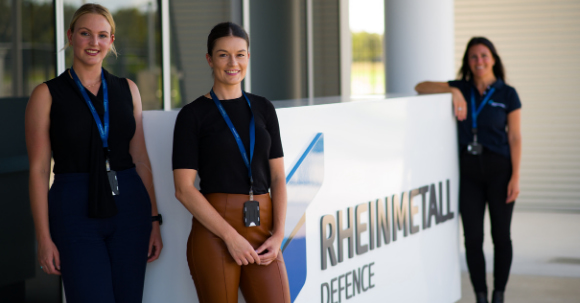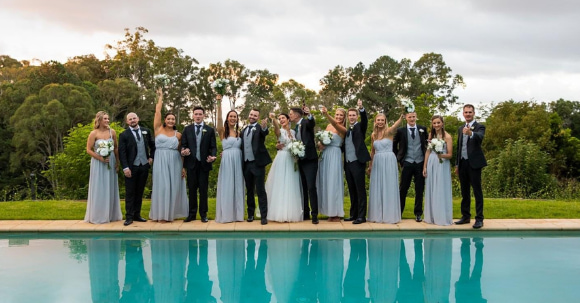Taneil Dye did not know what to expect when she joined the Defense industry. She soon discovered that Defence is an innovative industry that enables the Australian Defence Force to defend Australia, engage in peacekeeping and humanitarian missions.
Taneil has been with Rheinmetall Defence Australia for almost two years and has recently found her dream job as a Human Factors Specialist. We will explain more about that soon!
What defence contractors do
Rheinmetall is a technology group for mobility and security, and has a longstanding partnership with the Australian Defence Force. The company was established in 1889 and has a history dating back more than 40 years.
Rheinmetall Defence Australia (RDA) designs, develops and locally manufactures military vehicles, platforms and turrets for the ADF and exports to like-minded nations. The company works on various projects such as high mobility logistics trucks, tracked and wheeled combat vehicles and the research and development function is working on cutting-edge autonomous vehicles.
Based in Redbank, Queensland, RDA has recently established a Military Vehicle Centre of Excellence, to design, develop, manufacture and sustain military vehicles. A key vehicle to be delivered to the ADF is the BOXER 8×8 Combat Reconnaissance Vehicle
“A lot of the things we build helps deal with high threat environments as well as supporting humanitarian disasters, because [the defence forces] have such good resources and training. There are five variants of the BOXER – not all are battle tanks. There are ambulances, recovery trucks, repair trucks. There are tanks that go into war zones and pick up injured people as well as recover other vehicles.”
How understanding people makes all the difference
Taneil initially joined Rheinmetall’s HR team, while studying a full-time psychology degree. In her HR role, she was part of the organization’s ramp up, bringing hundreds of new staff on board and helping to build new HR systems to support the on-boarding process and employee experience. Looking back, that period is a bit of a blur for Taneil because she was so busy!
Then it was time to do her final practical placement for her Honors in Psychology and she discovered that the Human Engineering Team were Psychologists. The Human Factors Team inform engineers about human cognition such as attention, decision-making, situational awareness as well as taking into consideration other usability factors such as strength, vision, noise and temperature. Only days into her practical placement there, she knew Human Factors was what she wanted to do. Taneil returned to her old position for a short while but the business created a new role and she transitioned permanently into this nine months ago.

“It’s so interesting and there’s a real outcome. You can see how your research and application of defence standards and human factors methodology informs the design of safe and innovative products. We also ensure that the vehicle can sufficiently accommodate both female and male operators.”
“The Human Engineering team help inform the design of vehicles so that when men and women are in high threat environments, they can use the vehicle intuitively and make precise decisions under pressure in order to safely complete their missions.”
Advocating for change
Taneil shared an amazing success story from her team. Human Factors is a relatively new field for many industries, and engineers may not be accustomed to psychologists providing design advice and suggestions. They have to provide evidence for their advice and explain why modifications they recommend are important.
On a recent project, there was debate about the positioning of a joystick, whether it should be placed on the left or right hand side of the operator. The joystick is operated in high-threat environments that are extremely physically and mentally demanding for the operators. The joystick requires precision and in the heat of the battle is there to protect operators and their team.
The Human Factors team conducted in-depth research, including numerous user workshops, task analyses, a review of automatic decision-making literature, mental workload, training effects and principle of design consistency as well as applying Defence human engineering standards and performing a Human Error prediction analysis.

The outcome from their extensive analysis was a recommendation that the joystick be positioned on the right hand side, based on usability with the lowest associated risk. Their proposal was agreed and implemented.
We asked Taneil her tips for advocating for change successfully, since she’s had so much experience, and she shared some tips:
- Be prepared and lead with data. “It’s better to approach the situation with some research, so you’re not just advocating your opinion. Get all your ducks in a row. A lot of the time, the people you’re advocating to may not have a lot of time.”
- Know your audience. “If you are advocating for positive change in a business or team, try to understand the audience you are trying to influence and shape your approach accordingly.”
- Be really compassionate. “It can be easy to take any push back personally. However, it is valuable to take into consideration the other person’s perspective, role, values and agenda. Take a step back if someone is disagreeing with you to understand where they’re coming from, act with compassion and try to work together to achieve an outcome that is positive for as many people as possible.”
For the love of it
Taneil was initially attracted to Rheinmetall because there are so many opportunities as they grow. She was excited by the opportunity to build something up and help advocate for HR policies around parental leave and flexible work.
She’s studied full time the whole time, and Rheinmetall has been supportive with study leave and flexibility. They could see the value that her studies could bring to her role in the business and were really supportive of her career development. She has studied full-time Honors and Masters whilst working full-time at Rheinmetall and has been supported with study leave, flexible working arrangements and endless support from her managers.
“The culture is excellent. The diversity in the business is really beyond gender. We’re a melting pot of different nationalities, which I love. Everyone has such a cool way of applying their unique skills and knowledge to the projects.”
She shares their purpose of building the best vehicles to keep the country safe, and loves that everyone can be part of the change.
“Every day we’re creating new jobs, so you might join and then have the opportunity to apply for a newly created position that we don’t even know about now. There are boundless opportunities and I’ve never worked somewhere so innovative and friendly. This is my dream job.”




